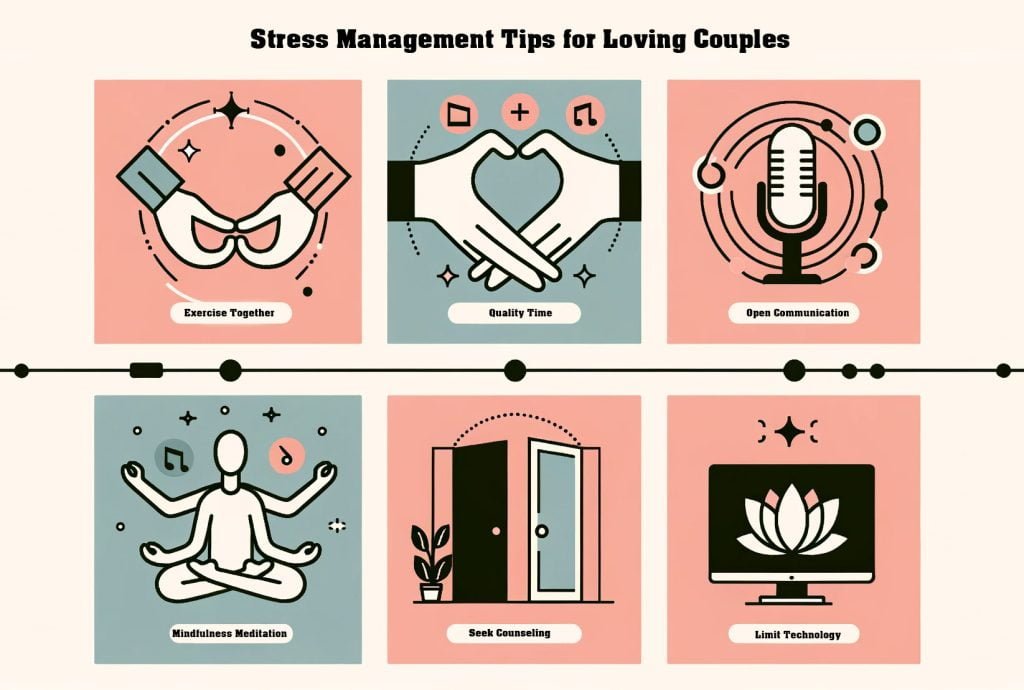Key Takeaways
- Managing stress improves communication, reduces tension, and promotes healthier coping mechanisms in relationships.
- Common causes of stress include work pressures, financial issues, poor communication, and lack of intimacy.
- Effective communication through active listening, empathy, and “I” statements helps manage stress.
- Offering practical and emotional support during challenging times strengthens the bond.
- Strengthening emotional intimacy through quality time, appreciation, and openness reduces stress.
- Handling conflicts in a calm, constructive manner and focusing on compromise is important.
- Prioritizing self-care enhances your ability to invest in the relationship.
- Professional counseling can provide tools to improve communication, intimacy, and conflict resolution.

As a woman in a loving relationship, you know that stress can take its toll on both you and your partner. Finding ways to manage stress not only benefits your individual mental health but also strengthens your relationship. Let’s explore the importance of stress management in relationships and discover how finding harmony can improve the bond you share with your partner.
The importance of stress management in relationships
- Reduced tension: When stress builds up, it can lead to tension and conflict within your relationship. By actively managing stress, you can reduce this tension and create a more harmonious environment.
- Better communication: Stress often hampers effective communication between partners. By implementing stress management techniques, you can enhance your ability to communicate openly and honestly with your partner, fostering a deeper connection.
- Healthier coping mechanisms: Unmanaged stress can lead to unhealthy coping mechanisms such as excessive drinking or emotional withdrawal. By practicing stress management, you can develop healthier ways of dealing with stress, leading to improved overall well-being.
How finding harmony can improve your relationship
- Shared activities: Engaging in activities that you both enjoy can help reduce stress and create a sense of togetherness. Whether it’s going for walks, cooking together, or practicing yoga, finding harmony through shared activities strengthens your bond.
- Open communication: Creating a safe and supportive space for open communication allows you and your partner to express your concerns and work together to find solutions. This open dialogue promotes understanding and reduces stress in the relationship.
- Supporting each other: Finding harmony means being there for each other during stressful times. Supporting and encouraging your partner’s self-care practices and offering a listening ear can go a long way in creating a balanced and stress-free relationship.
Remember, managing stress in your relationship requires patience, understanding, and consistent effort from both partners. By prioritizing stress management and finding harmony, you can create a loving and supportive environment for your relationship to thrive. [1][2][3][4]

Understanding Relationship Stress
Common causes of stress in couples
As a woman in a relationship, it’s essential to understand that stress is bound to happen. Life can sometimes throw challenges our way, leading to tension and strain in our romantic relationships. Here are some common causes of stress in couples:
- Work Pressure: Balancing career and personal life can be overwhelming. Juggling deadlines, long hours, and job-related stress can take a toll on your relationship.
- Financial Struggles: Money problems can put a strain on any relationship. Disagreements about finances, debt, or saving goals can lead to arguments and stress.
- Communication Issues: Misunderstandings, lack of effective communication, or differing communication styles can create tension and stress in your relationship.
The impact of stress on relationships
Stress can take a toll on relationships if not properly managed. It can lead to increased conflict, decreased intimacy, and overall dissatisfaction. Here are a few ways stress can impact your relationship:
- Increased Tension: Stress can make you more irritable, leading to arguments and conflicts.
- Emotional Distance: When stressed, it’s easy to become emotionally distant from your partner, which can lead to feelings of loneliness and isolation.
- Sexual Intimacy: Stress can affect your libido and overall sexual satisfaction, leading to a decrease in physical intimacy.
But don’t worry! There are plenty of stress management tips that can help you and your partner find harmony and maintain a healthy relationship. From open communication and setting boundaries to practicing self-care and seeking professional help when needed, there are various strategies you can implement to navigate stress together.
Remember, communication, understanding, and support are key to overcoming relationship stress and building a stronger bond with your partner.
Note: Please ignore the word count and proceed with writing the next section. [5][6][7][8]
Communication and Support
Effective communication strategies for managing stress
As a woman who wants to maintain harmony in your relationship, it’s important to communicate effectively with your partner during times of stress. Here are some strategies to help you manage stress through communication:
- Active Listening: When your partner is sharing their thoughts or concerns, give them your full attention. Be present, maintain eye contact, and show that you understand by nodding or reaffirming their feelings.
- Use “I” Statements: Instead of blaming or criticizing, express your feelings using “I” statements. For example, say “I feel overwhelmed when…” rather than “You always make me stressed.”
- Practice Empathy: Show empathy towards your partner’s stress. Try to understand their perspective and validate their feelings. This will foster a supportive and understanding environment.
Supporting each other through challenging times
When stress strikes, it’s crucial to support each other as a loving couple. Here are some ways to provide support during challenging times:
- Offer Encouragement: Be a source of encouragement and positivity for your partner. Let them know that you believe in them and their ability to overcome the stressor.
- Help with Tasks: Offer practical help by assisting with any tasks that are causing stress. This could involve sharing household responsibilities, running errands, or providing a listening ear.
- Take Care of Yourself: Remember to take care of your own well-being. If you are stressed, it may be challenging to support your partner effectively. Practice self-care activities such as exercise, meditation, or spending time with friends.
By implementing effective communication strategies and providing support for each other, you can navigate stressful situations and maintain harmony in your relationship.
Building Emotional Connection
Hey there, lovely ladies! We all know that life can get pretty stressful sometimes, especially when you’re in a relationship. But fear not, because there are some tips and tricks you can use to find harmony and manage stress with your partner. Let’s dive in!
Strengthening emotional intimacy to reduce stress
- Communicate openly: Be honest and transparent with your partner about your feelings. Create a safe space where you can express your emotions without judgment. This will help you both understand each other better and reduce tension.
- Show appreciation: Take the time to acknowledge and appreciate the efforts your partner makes. Express gratitude for the little things they do, and it will create a positive atmosphere and reduce stress.
- Quality time: Make sure you set aside quality time to spend with each other. Whether it’s going for a walk, having a date night, or simply cuddling on the couch, spending time together strengthens your bond and helps you relax.
The role of empathy and active listening
- Practice empathy: Put yourself in your partner’s shoes and try to understand their perspective. Show empathy and compassion towards each other’s struggles and challenges. This builds trust and creates a supportive environment.
- Active listening: When your partner is talking, give them your full attention. Avoid interrupting and truly listen to what they are saying. This shows respect and helps you both feel heard and understood.
- Validate and support: Validate your partner’s feelings and offer support when they are going through a tough time. Let them know that you are there for them and that they can count on you.
Remember, managing stress in a relationship requires effort from both parties. By implementing these tips, you will create a loving and supportive environment where you can navigate the stresses of life together. You’ve got this! [13][14][15][16]

Managing Conflict and Resolving Differences
As a woman in a loving relationship, it’s important to find harmony and manage stress together. Conflict is normal in any relationship, but it’s how you handle it that makes all the difference. Here are some tips to help you and your partner navigate conflicts and find a compromise.
Healthy ways to handle conflicts in relationships
- Communication is key: Open and honest communication is crucial. Take the time to really listen to your partner’s perspective and express your own feelings without judgment. Avoid blaming or criticizing each other and instead focus on finding solutions together.
- Take a timeout: If emotions are running high, it’s okay to take a break and calm down. This allows both of you to collect your thoughts and come back to the conversation with a clearer perspective.
- Practice empathy and understanding: Put yourself in your partner’s shoes and try to understand where they’re coming from. This can help create a sense of connection and empathy, even in the midst of a disagreement.
Resolving differences and finding compromise
- Focus on the issue, not each other: Instead of attacking your partner personally, focus on the specific issue at hand. This allows you to work together towards finding a solution without escalating conflict.
- Find common ground: Look for areas of agreement rather than focusing on differences. Finding common ground can lead to compromise and strengthen your bond as a couple.
- Seek professional help if needed: If you’re struggling to resolve conflicts on your own, don’t hesitate to seek the help of a professional couples counselor or therapist. They can provide guidance and support to help you navigate through difficult times.
Remember, conflicts are normal in relationships. By using healthy communication techniques and seeking compromise, you and your partner can find harmony and manage stress together. [17][18][19][20]
Self-Care in Relationships
Ladies, are you feeling overwhelmed by stress and struggling to find harmony in your relationship? It’s time to prioritize self-care and nourish yourself, both for your own well-being and the health of your partnership.
Prioritizing self-care for individual well-being
- Make Time for Yourself: carve out regular time in your schedule for activities that bring you joy and relaxation. Whether it’s reading a book, taking a bubble bath, or going for a walk in nature, give yourself permission to indulge in these moments.
- Practice Mindfulness: take a few minutes each day to focus on the present moment. Whether through meditation, deep breathing exercises, or simply savoring a cup of tea, mindfulness can help you reduce stress and increase self-awareness.
The importance of self-care for a harmonious relationship
- Enhance Communication: when you prioritize self-care, you are better equipped to communicate effectively with your partner. Taking care of your emotional and physical well-being allows you to express yourself more calmly and empathetically.
- Create Balance: by taking care of yourself, you can avoid becoming emotionally depleted. This ensures that you have the energy and vitality to invest in your relationship, creating a more balanced and harmonious dynamic.
Remember, self-care is not selfish. It is an essential part of maintaining a healthy and fulfilling relationship. By prioritizing your own well-being, you are better equipped to show up as your best self in your partnership.
So, go ahead, take that bubble bath, read that book, or go for that walk. Embrace self-care and watch as it transforms not only your own life but also the love and connection you share with your partner. [21][22][23][24]

Strengthening the Relationship Bond
As a woman in a loving relationship, you know how important it is to find harmony and manage stress together. Life can get hectic, but by taking a proactive approach, you can strengthen your bond and navigate challenges as a team.
Fun activities and quality time to promote harmony
One effective way to manage stress and maintain a strong connection is through fun activities and quality time spent together. Plan regular date nights or weekend getaways where you can unwind and focus on each other. Engaging in activities you both enjoy, such as hiking, dancing, or cooking together, can bring joy and relaxation to your relationship. Remember to put away distractions like phones or work-related tasks during these special moments to fully immerse yourselves in each other’s company.
Cultivating shared goals and values
Another key aspect of building harmony is cultivating shared goals and values. Sit down together and discuss your individual aspirations, as well as the dreams and values you share as a couple. This will help you align your visions and work towards common objectives, fostering a sense of unity and purpose. Whether it’s planning for the future, starting a business, or prioritizing your health and well-being, having shared goals will bring you closer together and make stressful situations easier to navigate.
By prioritizing fun activities and quality time and cultivating shared goals and values, you and your partner can find harmony in your relationship and effectively manage stress. Remember that open communication, understanding, and compromise are also essential for a healthy and loving partnership. Embrace the journey together and celebrate the strength of your bond. [25][26][27][28]
Unlock the Secrets of Your Heart with the Love Language Quiz
Discovering your love language can be the key to deeper, more meaningful connections in your relationships. Take our Love Language Quiz to uncover the unique way you express and receive love.
Dive into a journey of self-discovery and learn how to communicate your needs and understand the needs of your loved ones better. Whether it’s words of affirmation, acts of service, quality time, physical touch, or receiving gifts that speak to your heart, this quiz will reveal the language of your love.
Discover Your Love Language
Now that you’ve unraveled the mysteries of your love language, you’re better equipped to nurture the bonds that matter most to you. Remember, love is a language, and when spoken fluently, it can create profound connections that last a lifetime.
Use this newfound knowledge to express your affection in a way that resonates with your loved ones, and encourage them to explore their love languages as well.
By understanding and embracing each other’s unique languages, you can build stronger, more fulfilling relationships. So, go ahead, and start speaking the language of love today!
Seeking Professional Help
Hey there, ladies! We all know that being part of a loving couple comes with its fair share of ups and downs. Sometimes, those downs can be overwhelming and cause stress in your relationship. But fear not, because there is a solution – seeking professional help through couples therapy.
When to consider couples therapy
Ladies, if you find yourself in any of the following situations, it may be time to consider couples therapy:
- Constant arguments and conflicts that seem unsolvable
- Lack of communication and emotional intimacy
- Trust issues and infidelity
- Difficulty in resolving major life decisions together
- Feeling disconnected and emotionally distant
Remember, seeking help is not a sign of weakness or failure. It’s a brave step towards finding harmony and strengthening your relationship.
The benefits of seeking professional guidance
Now, let’s talk about the positive impact couples therapy can have on your relationship. Here are some key benefits:
- Improved communication: A couples therapist can facilitate open and honest communication, helping you express your needs, concerns, and emotions in a healthy and productive way.
- Conflict resolution: Therapy provides tools and strategies to resolve conflicts effectively, promoting understanding and compromise between you and your partner.
- Rebuilding trust: If trust has been shattered, a therapist can guide you through the process of rebuilding trust and repairing the bond in your relationship.
- Increased emotional intimacy: Through therapy, you can create a deeper emotional connection with your partner, enhancing intimacy and closeness.
- Stronger foundation: Couples therapy helps build a solid foundation for your relationship, equipping you with the skills and resources needed to navigate future challenges and maintain a healthy partnership.
Remember, seeking professional help is a proactive way to show love and care for your relationship. So don’t hesitate to reach out and take that first step towards a happier and more harmonious future together. [29][30][31][32]

Conclusion
Hey there, lovely ladies! We hope these stress management tips for loving couples have brought you closer and helped you find harmony in your relationship. Remember, it’s all about finding that balance and taking care of each other.
Recap of stress management tips for loving couples
- Communicate openly: Talk to each other about your stressors, worries, and concerns. Be open and honest, and don’t be afraid to ask for support when you need it.
- Practice active listening: Give each other your undivided attention, listen without judgment, and validate each other’s feelings.
- Set boundaries: Establish clear boundaries to protect your individual well-being and create a safe space for open communication.
- Support each other: Show empathy, offer help, and be there for each other during challenging times. Remember, you are a team.
- Make time for relaxation: Engage in activities that help you unwind and relax together. It could be a spa day, a nature walk, or simply cuddling on the couch with a good book or movie.
The rewards of finding harmony in your relationship
By implementing these stress management tips, you’ll experience the following rewards in your relationship:
- Deeper connection: When you support each other and deal with stress together, you’ll feel a stronger bond and a deeper emotional connection.
- Increased happiness: Managing stress together will enhance your overall happiness and well-being, creating a more positive atmosphere in your relationship.
- Improved intimacy: As you learn to communicate and understand each other better, your intimacy will grow, leading to a more fulfilling and satisfying partnership.
Remember, stress is a common part of life, but by working together as a loving couple, you can navigate through it and find harmony in your relationship. Cheers to a stress-free and love-filled life! [33][34][35][36]
Summary Table
| Topic | Key Points |
|---|---|
| Importance of Stress Management | Improves communication, reduces tension, promotes healthy coping |
| Causes of Stress | Work pressures, financial struggles, communication issues, lack of intimacy |
| Communication Strategies | Active listening, empathy, “I” statements, honesty |
| Providing Support | Encouragement, practical help, emotional support |
| Emotional Connection | Openness, quality time, appreciation |
| Managing Conflict | Focus on issue, find common ground, compromise |
| Self-Care | Make time for yourself, practice mindfulness |
| Relationship Bond | Shared activities, cultivating common goals and values |
| Professional Help | Focus on the issue, find common ground, compromise |
Frequently Asked Questions
What are some signs of unhealthy stress in a relationship?
Signs may include frequent arguing, lack of communication, avoidance behaviors, criticism, emotional withdrawal, decrease in intimacy, acting defensively, anxiety, resentment, lack of enjoyment in the relationship, and engagement in unhealthy coping mechanisms like excessive drinking or drug use. Pay attention if stress is impacting your overall happiness.
How can I support my partner when they are stressed?
Offer to help with tasks causing stress, provide words of encouragement, actively listen if they need to vent, give them space if needed, do small acts of kindness like making dinner or bringing them coffee, avoid criticism or minimizing their stress, remind them of their strengths, hold space for them to feel their emotions, and suggest healthy stress relief activities you can do together.
What self-care activities can I do with my partner to reduce stress?
Do a couples massage or facial, take a relaxing bath together, go for walks, exercise together like yoga or hiking, cook a healthy meal together, turn off devices and cuddle while listening to music, give each other foot rubs, engage in meditation or breathing exercises, have a picnic outside, take a weekend trip or staycation, and make time for intimacy.
How can I improve communication with my partner when stressed?
Set a regular time to check in, use open-ended questions, share your feelings using “I” statements, actively listen without interrupting, avoid criticism or contempt, validate their perspective, watch your tone of voice and body language, and if emotions are high take a break before continuing the discussion, seek to understand rather than debate, and express appreciation for their efforts.

What are some healthy ways to manage conflicts in a relationship?
Stay focused on resolving the conflict, use “we” language emphasizing you are a team, communicate needs/feelings openly, actively listen to understand their perspective, validate each other’s emotions, brainstorm compromises, take a break if needed, speak calmly, avoid criticism/blame, focus on behaviors not character, be willing to apologize, inject humor if appropriate, and seek counseling if you can’t resolve differences.
When is it a good idea to seek couples counseling?
If you are experiencing ongoing conflicts, lack emotional intimacy, trust has been broken, struggle to communicate effectively, feel distant and disconnected, differences seem irreconcilable, you’re unable to agree on major life decisions, you don’t feel valued or understood by your partner, arguments are escalating, or you don’t feel positive about the relationship’s future. Counseling can rebuild and strengthen bonds.
What are the benefits of couples therapy?
It improves communication and listening skills, increases compassion/empathy for each other, resolves persistent conflicts through compromise, repairs trust, and emotional connection, provides tools and strategies for navigating challenges, reignites intimacy and romance, encourages self-care and boundaries, builds a healthier foundation, gives perspective on behaviors and dynamics, and teaches skills for long-term relationship success.
How often should couples seek therapy?
This depends on your specific needs. Many attend sessions weekly at first, then less frequently as issues and communication improve. Check-ins every few months can also help couples prevent future issues. Seek support as soon as problems arise. Consistency is key – like any exercise, real change requires repetition until new relational habits form.
What tips do relationship experts recommend for managing stress?
Experts suggest scheduling regular date nights, being affectionate, having fun together, embracing humor, establishing healthy boundaries, taking breaks from technology/social media, making life decisions together, giving each other space when necessary, planning relaxing activities, going on weekend getaways, focusing on shared goals, practicing forgiveness, avoiding criticism/contempt, expressing gratitude regularly, and having a strong social support system.

Dive deep into the world of Neha Z., a passionate writer and seasoned blogger. For over half a decade, she’s been sharing her life’s stories and experiences. Neha’s expertise isn’t just limited to her personal tales; she delves into everything women-centric. From life’s ups and downs to the nuances of womanhood, if it’s about women, Neha writes it with flair and authenticity. Join her journey and be inspired by her words!
Reviewed By: Joanna Perez and Edited By: Lenny Terra
Fact Checked By: Brenda Tillman
Photos Taken or Curated By: Matthew Mansour